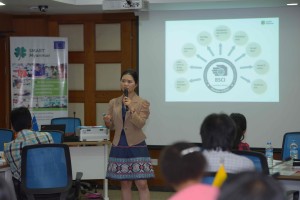The 3rd SMART Social Compliance Academy™ kicked off in February with another social compliance masterclass scheduled to begin in July.
Written by May Mi Kyaw, Social Compliance Expert
In February, the SMART Myanmar technical team was pleased to launch our 3rd social compliance academy. Two previous compliance academies were piloted and developed in 2015. Now, we are proud to offer the SMART Social Compliance Academy™ as a comprehensive and proven approach to factory improvements in social compliance. The Academy is led by Ms. Nancy Feng, our senior technical expert, along with our team of 8 local experts, including myself and seven of my colleagues.

Our objective is to help garment factories eliminate major occupational health and safety risks, reduce employee turnover, and improve workplace relations through effective HR management and workplace communications. All of these things are essential conditions for European buyers. As such, putting in place effective management systems and sustainable business practices equips companies for long-term success.
Every Academy we run starts with a two-day group training. This happened most recently, on February 24th and 25th and another batch of factory managers will begin in July. Three foreign-invested garment factories and four locally owned factories joined the current training batch, which means 15 participants from top and middle management attended the induction masterclass and have agreed to be present for the on-site consultancies within their factory. The training covers: management systems, trouble-shooting of common issues, self-assessment procedures, corrective action strategies & the continuous improvement approach, and especially root-cause analysis.
The Academy was opened with a greeting and introduction by Mr. Jacob Clere, Team Leader of the project. Participants introduced themselves and shared their expectations from the training and the risks/challenges in their own factories which they had already identified and which had caused many of them to want to join our improvement program.
Over the course of both days Ms. Feng explained to the group:
• Why social compliance must be part of a factory’s core business in order for the company to be successful. Factories with safe environments and healthy workplace relations are more productive and enjoy better business possibilities.
• The necessities of BSCI and comparisons with Myanmar’s specific legal requirements, especially as it relates to child labor, young workers, general management, working hours, remuneration, freedom of association, grievance mechanisms, forced labor, disciplinary actions and discrimination.
• The topics of environmental health and safety (EHS) were introduced, especially how to handle chemicals safety and about the impact a factory has on its surrounding environment.
• The assessment process was discussed, including how to address issues and make corrections, especially within the “SMART” approach (Specific, Measurable, Achievable, Relevant, Time-bound).
• Root cause analysis and the continuous improvement approach were demonstrated as key tools useful for ensuring permanent solutions rather than quick fixes.
Our approach following the induction training is to hold on-site social compliance assessments at each factory. This is further followed up with several follow-up assessments over nearly a half-year to support and advise the factories as they work to implement improvements.
We have found our Academy approach to be extremely effective at achieving systemic and sustainable solutions and plan to run this program for the next four years, in addition to our many other actions. In this way, we hope to elevate a significant percentage of the industry to a higher standard.










